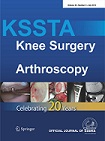
Sports Medicine
The effect of knee extensor open kinetic chain resistance training following ACL injury
This report has been verified
by one or more authors of the
original publication.
Knee Surg Sports Traumatol Arthrosc. 2015 Nov;23(11):3168-77.
58 patients diagnosed with an anterior cruciate ligament injury (ACLI) were randomly assigned to one of three treatment regimens for the purpose of determining whether one protocol was advantageous over the others in terms of its ability to reduce anterior knee laxity. Patients received either standard rehabilitation alone or standard rehabilitation in addition to knee extensor open kinetic chain resistance training utilizing either high-load resistance or low-load resistance. The results found low-load resistance knee extensor open kinetic chain training to result in significantly reduced laxity scores at the 12-week assessment compared to both high-load and standard rehabilitation alone. All three regimens were found to significantly improve knee joint flexion range of motion from baseline to 12 weeks, while having no significant effect on IKDC scores, Lysholm scores, Tegner scores, Hughston scores, the SF-36 physical and mental summary scores, functional outcome, knee joint girth, and knee joint extension range of motion.
Unlock the full article
Get unlimited access to OrthoEvidence with a free trial
Start TrialCritical appraisals of the latest, high-impact randomized controlled trials and systematic reviews in orthopaedics
Access to OrthoEvidence podcast content, including collaborations with the Journal of Bone and Joint Surgery, interviews with internationally recognized surgeons, and roundtable discussions on orthopaedic news and topics
Subscription to The Pulse, a twice-weekly evidence-based newsletter designed to help you make better clinical decisions
Exclusive access to original content articles, including in-house systematic reviews, and articles on health research methods and hot orthopaedic topics
Or continue reading this full article
Register Now

Subscribe to "The Pulse"
Evidence-Based Orthopaedics direct to your inbox.





































